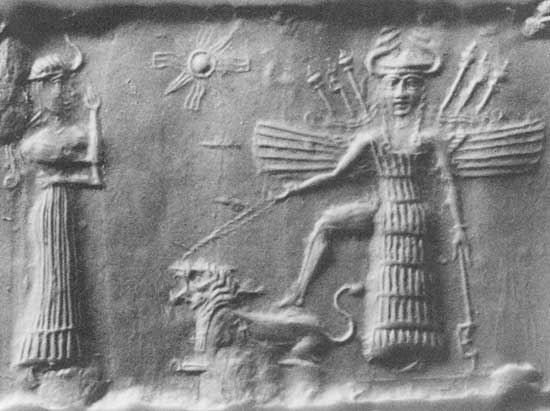Scan barcode
A review by graywacke
Inanna by Diane Wolkstein
5.0

Radiant Inanna, from an Akkadian cylindrical stone seal, 2334-2154 bce
39. Inanna, Queen of Heaven and Earth : Her Stories and Hymns from Sumer translated by Diane Wolkstein & Samuel Noah Kramer
Art compiled by Elizabeth Williams-Forte
Published: 1983. Original from various time periods, roughly 2000 bce.
format: 226 page paperback
acquired: borrowed from Library
read: June 24-26
rating: 5 stars
In the first days, in the very first days,Something special happened here. This is more than a translation of ancient literature. This is really an interpretation, a work of art, Diane Wolkstein's recreation. There is some kind synergy at play.
In the first nights, in the very first nights,
in the first years, in the very first years,
The source is, of course, the Cuneiform fragments found throughout the southern Iraq and other parts of the Middle East. The literary fragments, which include [b:The Epic of Gilgamesh|19351|The Epic of Gilgamesh|Anonymous|https://d.gr-assets.com/books/1388287904s/19351.jpg|3802528], the Babylonian [b:Enuma Elish: The Seven Tablets of the History of Creation|233420|Enuma Elish The Seven Tablets of the History of Creation|Anonymous|https://d.gr-assets.com/books/1348983657s/233420.jpg|2342851] and many other mythological elements also preserve, in pieces here and there, elements of the story of the goddess Inanna. She is known elsewhere as Ishtar and in the bible is referred to as Astarte, and her worship, there severely forbidden, to the Astarte poles.
Four stories about Inanna, and seven short hymns to her, are reconstructed. The Huluppu-Tree, where Inanna rescues the tree, then needs the help of Gilgamesh to get rid of it's pollutants, like (the biblical) Lilith, who built a home in her tree. Inanna and the God of Wisdom, where she gets drunk with Enki, the God of Wisdom, and then essentially steals all his wisdom, in the form of Me (pronounced like May). Enki sobers up, but can't recover his Me. Then, heavily sexual, is The Courtship of Inanna and Dumuzi (Dumuzi is biblical Tammuz). Finally is there is the three part story, The Descent of Inanna, where Inanna is drawn into the underworld. There, she is stripped of all possessions, all clothing and killed, or trapped in the underworld as a corpse. She is rescued, but must find a replacement. She eventually offers up Dumuzi.
The reconstruction of these stories from fragments was a major effort, and Samuel Noah Kramer played a large role in this. But what Wolkstein does is something different. She hashed over all the possible meanings, and then comes up with her own interpretation. So, the translation becomes an interpretation and her own creation. It's somehow raw, fundamental, and beautiful. It's exceptionally well done.
It's also very feminist. "Rejoicing at her wondrous vulva", Inanna is not an underling, ruled by a Zeus-like head god, but very much her own. She evolves in the stories from uncertainty, to a savvy sexual power, to a goddess affecting fertility and the seasons and, in many ways, the daily lives of her worshipers.
In her introduction, Wolkstein recreates a conversation with Kramer, providing some insight into how she approaches this work:
"In the first line of 'The Descent of Inanna,' 'From the Great Above she set her mind to the Great below,' what exactly does 'mind' mean?"(She ends up translating "From the Great Above she opened her ear to the Great Below")
"Ear," Kramer said.
"Ear?"
"Yes, the word for ear and wisdom in Sumerian are the same. But mind is what is meant."
"But—I could say 'ear'?"
"Well, you could."
"Is it opened her ear or set her ear?"
"Set. Set her ear, like a donkey that sets its ear at a particular sound."
As Kramer spoke, a shiver ran through me. When taken literally, the text announces the stories direction: From the Great Above the goddess opened (set) her ear, her receptor for wisdom, to the Great below.